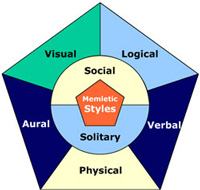 |
|
 |
The Verbal (Linguistic) Learning Style
The verbal style involves both the written and spoken word. If you use
this style, you find it easy to express yourself, both in writing and
verbally. You love reading and writing. You like playing on the meaning or
sound of words, such as in tongue twisters, rhymes, limericks and the like.
You know the meaning of many words, and regularly make an effort to find the
meaning of new words. You use these words, as well as phrases you have
picked up recently, when talking to others.
Common pursuits and phrases
Pursuits that use the verbal style include public speaking, debating,
politics, writing and journalism.
You may tend to use phrases like these:
- Tell me word for word
- Let's talk later.
- The word you're looking for is
- I hear you but I'm not sure I agree.
- Let me spell it out for you.
- In other words
Learning and techniques
-
If you are a verbal learner, try the techniques that involve speaking and
writing. Find ways to incorporate more speaking and writing in techniques.
For example, talk yourself through procedures in the simulator, or use
recordings of your content for repetition.
-
Make the most of the word-based techniques such as assertions and
scripting. Use rhyme and rhythm in your assertions where you can, and be
sure to read important ones aloud. Set some key points to a familiar song,
jingle or theme.
-
Mnemonics are your friends for recalling lists of information. Acronym
mnemonics use words, focusing on the first letter of the word to make up
another word or memorable sequence. You can also make up phrases using the
items you want to memorize.
-
Scripting is also powerful for you. You don't just have to write them
down. Record your scripts using a tape or digital audio recorder (such as an
MP3 player), and use it later for reviews.
-
When you read content aloud, make it dramatic and varied. Instead of
using a monotone voice to go over a procedure, turn it into a lively and
energetic speech worthy of the theatre. Not only does this help your recall,
you get to practice your dramatic presence!
-
Try working with others and using role-playing to learn verbal exchanges
such as negotiations, sales or radio calls.
|
 |

